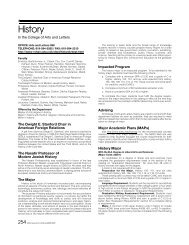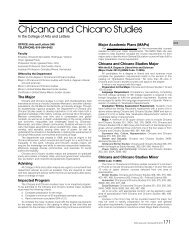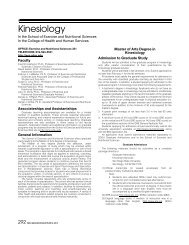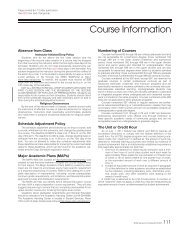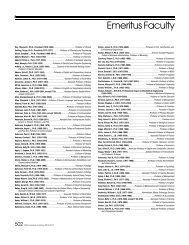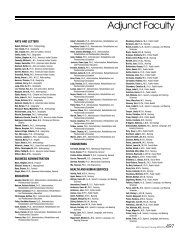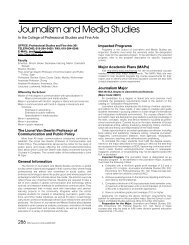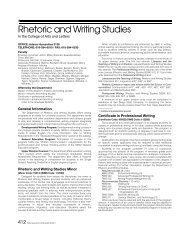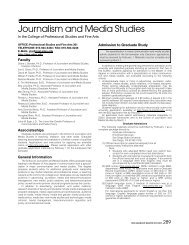sdsu graduate bulletin 2012-2013 - San Diego State University ...
sdsu graduate bulletin 2012-2013 - San Diego State University ...
sdsu graduate bulletin 2012-2013 - San Diego State University ...
You also want an ePaper? Increase the reach of your titles
YUMPU automatically turns print PDFs into web optimized ePapers that Google loves.
Linguistics<br />
In the Department of Linguistics and Asian/Middle Eastern Languages<br />
In the College of Arts and Letters<br />
OFFICE: Education and Business Administration 334<br />
TELEPHONE: 619-594-5268 / FAX: 619-594-4877<br />
http://www.rohan.<strong>sdsu</strong>.edu/dept/linguist/index.html<br />
Faculty<br />
Ghada Osman, Ph.D., Associate Professor of Arabic,<br />
Chair of Department<br />
Zev Bar-Lev, Ph.D., Professor of Linguistics, Emeritus<br />
Soonja Choi, Ph.D., Professor of Linguistics (Graduate Adviser)<br />
Jean Mark Gawron, Ph.D., Professor of Linguistics<br />
Yoshiko Higurashi, Ph.D., Professor of Japanese<br />
(Director, Japanese Language Program)<br />
Jeffrey P. Kaplan, Ph.D., Professor of Linguistics<br />
Deborah Poole, Ph.D., Professor of Linguistics<br />
Gail L. Robinson, Ph.D., Professor of Linguistics<br />
Robert Underhill, Professor of Linguistics, Emeritus<br />
Eniko Csomay, Ph.D., Associate Professor of Linguistics and<br />
Associate Dean of the College of Arts and Letters<br />
Ryu Kitajima, Ph.D., Associate Professor of Japanese<br />
Robert P. Malouf, Ph.D., Associate Professor of Linguistics<br />
Betty T. R. Samraj, Ph.D., Associate Professor of Linguistics<br />
Ruey-Jiuan Regina Wu, Ph.D., Associate Professor of Linguistics and<br />
Asian/Middle Eastern Languages<br />
Zheng-sheng Zhang, Ph.D., Associate Professor of Chinese<br />
Gregory D. Keating, Ph.D., Assistant Professor of Linguistics<br />
Associateships<br />
Graduate teaching associateships in linguistics are offered each<br />
semester to a limited number of qualified students to teach introductory<br />
linguistics and the composition courses for international students. Those<br />
interested should send a letter of application to the <strong>graduate</strong> adviser.<br />
General Information<br />
The Department of Linguistics and Asian/Middle Eastern<br />
Languages offers <strong>graduate</strong> study leading to the Master of Arts degree in<br />
linguistics. The interdisciplinary program provides broad educational<br />
opportunities through three specializations: 1) General Linguistics, for<br />
those planning to pursue a doctorate in theoretical areas (e.g., syntax or<br />
phonology) or for those who plan to work in a language-related field in<br />
industry or education; 2) TESOL/Applied Linguistics, for students<br />
intending to teach or design curriculum for ESL/EFL/ELD classrooms<br />
(including community college and K-12 levels) or planning to pursue a<br />
doctorate in applied linguistics; 3) Computational Linguistics, for those<br />
planning a career in business or industry in computational linguistics, or<br />
a doctorate in this area. In addition to completing coursework for one of<br />
the specializations and demonstrating proficiency in a foreign<br />
language, students are required to submit a thesis (PlanA) or pass a<br />
comprehensive examination (Plan B).<br />
All students who complete the required program will receive a<br />
Master of Arts degree in linguistics. If requested, the department will<br />
provide a letter designating a student’s specialization for purposes of<br />
employment or application for further study. The specializations and<br />
language research interests of faculty members in this program are:<br />
Zev Bar-Lev – ESL, discourse analysis, linguistics and computers;<br />
Hebrew, Arabic, and Russian.<br />
Soonja Choi – Psycholinguistics, first and second language<br />
acquisition, cognition and language, ESL, materials development;<br />
Korean, French.<br />
Eniko Csomay – ESL, corpus linguistics, discourse analysis,<br />
language variation, classroom discourse, research methods.<br />
Jean Mark Gawron – Computational linguistics (parsing,<br />
pragmatic narrowing, machine translation); semantics (quantification,<br />
anaphora, comparatives, lexical semantics).<br />
Yoshiko Higurashi – Phonology, accent and intonation, syllable<br />
structure, speech pathology, intercultural communication, Japanese<br />
language teaching.<br />
Jeffrey P. Kaplan – Syntax, semantics, pragmatics, discourse,<br />
language and law; Swahili.<br />
Gregory D. Keating – Second language acquisition, psycholinguistics<br />
(eye-tracking research), sentence processing, Spanish<br />
linguistics.<br />
Ryu Kitajima – Second language acquisition, language<br />
assessment, teaching methodologies and language pedagogy.<br />
Robert P. Malouf – Computational linguistics, statistical natural<br />
language processing, machine learning, constraint-based grammar<br />
formalisms.<br />
Deborah Poole – Classroom interaction, discourse analysis,<br />
cross-cultural interaction, ESL methods and materials.<br />
Gail L. Robinson – Second language methodology, second<br />
language and culture acquisition, psycholinguistics; Spanish.<br />
Betty T. R. Samraj – Discourse analysis, writing in the disciplines,<br />
ESL methods and materials, systemic-functional linguistics.<br />
Robert Underhill – Descriptive linguistics, phonology, syntax,<br />
discourse; Turkish, Native American languages, Southeast Asian<br />
languages.<br />
Ruey-Jiuan Regina Wu – Conversation analysis, pragmatics, and<br />
functional linguistics, with particular emphasis on Mandarin Chinese;<br />
language assessment; teaching methodologies, and language<br />
pedagogy.<br />
Zheng-sheng Zhang – Chinese language structure (semantics,<br />
pragmatics, discourse analysis, dialects). Language pedagogy.<br />
Technology for language teaching.<br />
Admission to Graduate Study<br />
In addition to meeting the requirements for admission to the<br />
university with classified <strong>graduate</strong> standing, as described in Part Two<br />
of this <strong>bulletin</strong>, the student must have a Bachelor of Arts degree in<br />
linguistics or a related field that would demonstrate adequate<br />
preparation for the program.<br />
Students applying for admission should electronically submit the<br />
university application available at http://www.csumentor.edu along<br />
with the $55 application fee.<br />
All applicants must submit admissions materials separately to<br />
SDSU Graduate Admissions and to the Department of Linguistics and<br />
Asian/Middle East Languages.<br />
Graduate Admissions<br />
The following materials should be submitted as a complete<br />
package directly to:<br />
Graduate Admissions<br />
Enrollment Services<br />
<strong>San</strong> <strong>Diego</strong> <strong>State</strong> <strong>University</strong><br />
<strong>San</strong> <strong>Diego</strong>, CA 92182-7416<br />
(1) Official transcripts (in sealed envelopes) from all<br />
postsecondary institutions attended;<br />
Note:<br />
Students who attended SDSU need only submit transcripts<br />
for work completed since last attendance.<br />
Students with international coursework must submit both<br />
the official transcript and proof of degree. If documents<br />
are in a language other than English, they must be<br />
accompanied by a certified English translation.<br />
SDSU GRADUATE BULLETIN <strong>2012</strong>-<strong>2013</strong> 305
Linguistics<br />
(2) GRE scores (http://www.ets.org, SDSU institution code 4682).<br />
All students are required to have GRE scores of 1050 or better<br />
on the combined verbal/quantitative portions of the test (with a<br />
minimum of 500 on each part);<br />
(3) English language score, if medium of instruction was in a<br />
language other than English (http://www.ets.org, SDSU<br />
institution code 4682). Students who have a B.A. from a<br />
university where English is not the primary medium of<br />
instruction are required to have English language scores of 570<br />
or better. The TWE (Test of Written English) is also required, and<br />
will primarily be used to advise students regarding their<br />
program of courses.<br />
Department of Linguistics and Asian/Middle Eastern Languages<br />
The following materials should be mailed or delivered to:<br />
Department of Linguistics and Asian/Middle Eastern<br />
Languages (EBA-334)<br />
(Attention: Graduate Adviser)<br />
<strong>San</strong> <strong>Diego</strong> <strong>State</strong> <strong>University</strong><br />
5500 Campanile Drive<br />
<strong>San</strong> <strong>Diego</strong>, CA 92182-7727<br />
(1) A statement of purpose (250-500 words) which demonstrates<br />
an understanding of the SDSU program and which show<br />
interest in an area of research that is within the department’s<br />
score of expertise;<br />
(2) Two letters of recommendation be sent directly from the<br />
recommenders (who can evaluate the applicant’s academic<br />
potential) to the Department of Linguistics and Asian/Middle<br />
Eastern Languages <strong>graduate</strong> adviser.<br />
A student who is deficient in any of the above requirements may be<br />
considered for conditional admission. A candidate may be required to<br />
complete specified courses within a specific time period in addition to<br />
completing the minimum 30 units required for the degree.<br />
The fall semester <strong>graduate</strong> application (CSUMentor on-line<br />
application is February 1. In order to ensure consideration, other<br />
application materials must be sent to the Office of Graduate<br />
Admissions (transcripts and test scores) and to the department<br />
(statement of purpose and recommendation letters) by March 1.<br />
For any updates about <strong>graduate</strong> admission and information about<br />
spring semester admission, go to the department Web site at<br />
http://www-rohan.<strong>sdsu</strong>.edu/dept/linguist/<strong>graduate</strong>_information/<br />
admissions.htm. For additional information, contact Yasmine Panahi at<br />
ypanahi@mail.<strong>sdsu</strong>.edu and request an M.A. information packet.<br />
Advancement to Candidacy<br />
All candidates must satisfy the general requirements for<br />
advancement to candidacy as described in Part Four of this <strong>bulletin</strong>. In<br />
addition to the requirements listed, students must demonstrate<br />
reading or speaking knowledge of at least one foreign language prior<br />
to advancement to candidacy.<br />
Specific Requirements for the<br />
Master of Arts Degree<br />
(Major Code: 15051) (SIMS Code: 114701; TESOL Applied 114705;<br />
Computational Linguistics 114706)<br />
In addition to meeting the requirements for classified <strong>graduate</strong><br />
standing and the basic requirements for the Master of Arts degree, as<br />
described in Part Four of this <strong>bulletin</strong>, the student must complete a<br />
<strong>graduate</strong> program of at least 30 units of 500-, 600-, and 700-level<br />
courses to include Linguistics 502, 503, and 795 (a prerequisite to<br />
Linguistics 502 and 503 is completion of Linguistics 501 or equivalent).<br />
A minimum of 15 of the units taken must be from 600- or 700-level<br />
courses.<br />
Students selecting the General Linguistics specialization must<br />
complete either Linguistics 621 or Linguistics 622, and six units from<br />
the following: Linguistics 610, 620, 640, 654, 660, 696 (with general<br />
linguistics content).<br />
306 SDSU GRADUATE BULLETIN <strong>2012</strong>-<strong>2013</strong><br />
Students selecting the TESOL/Applied (ESL/Applied) specialization<br />
must complete Linguistics 652, and at least six units from the<br />
following: Linguistics 623, 650, 653, and 655. An internship,<br />
Linguistics 740, is required of all students selecting this specialization<br />
who have not taught ESL previously.<br />
Students selecting the Computational Linguistics specialization<br />
must complete Linguistics 581 or Computer Science 581, Linguistics<br />
582, and six units selected from Linguistics 620, 654, 681, 696 (when<br />
offered with computational linguistics content). The <strong>graduate</strong> electives<br />
should be approved by the <strong>graduate</strong> adviser. A prerequisite to the<br />
Computational Linguistics specialization is completion of<br />
Linguistics 570 or equivalent.<br />
Students selecting one specialization may enroll in courses from<br />
the other specialization as electives.<br />
With the approval of the <strong>graduate</strong> adviser, a maximum of six units<br />
selected from the following courses will be accepted for <strong>graduate</strong><br />
credit in linguistics: Anthropology 604; Computer Science 550, 560,<br />
562, 596 (when offered with computational linguistics content), 620,<br />
696 (when offered with computational linguistics content), Rhetoric<br />
and Writing Studies 602; Spanish 561, 770; Speech, Language, and<br />
Hearing Sciences 790, 793.<br />
In addition, with approval of the <strong>graduate</strong> adviser, a student must<br />
choose either a thesis (Plan A), or a written comprehensive<br />
examination (Plan B). Plan A students must select a committee of three<br />
faculty, two of whom are from the department, to supervise the thesis.<br />
In consultation with the <strong>graduate</strong> adviser, students select one of two<br />
options at the time of filing an official program of study.<br />
Advanced Certificate in Teaching English as<br />
a Second or Foreign Language (TESL/TEFL)<br />
(Major Code: 90035) (SIMS Code: 114786)<br />
The Department of Linguistics and Asian/Middle Eastern<br />
Languages offers a Basic and an Advanced Certificate in Teaching<br />
English as a Second or Foreign Language (TESL/TEFL). The<br />
Advanced Certificate requires Linguistics 652; two courses from<br />
Linguistics 650, 653, 655, and 795 (when offered with applied<br />
linguistics content); and one course from Linguistics 530, 622, 623,<br />
654, and 795. Students must obtain a 3.0 GPA overall in the courses<br />
for the advanced certificate. The prerequisite to the Advanced<br />
Certificate is the Basic Certificate or its equivalent. A student’s entire<br />
program comprising Basic and Advanced Certificates must include at<br />
least one course from Linguistics 530, 622, and 623. Under certain circumstances<br />
comparable courses taken at other institutions may count<br />
toward the certificate. Such courses must be evaluated and approved<br />
by the certificate adviser. For information on the Basic Certificate,<br />
please see the General Catalog.<br />
Courses Acceptable on Master’s Degree<br />
Programs in Linguistics (LING)<br />
Refer to Courses and Curricula and Regulations of the Division of Graduate<br />
Affairs sections of this <strong>bulletin</strong> for explanation of the course numbering<br />
system, unit or credit hour, prerequisites, and related information.<br />
UPPER DIVISION COURSES<br />
LING 501. Fundamentals of Linguistics (3)<br />
Prerequisite: Upper division standing.<br />
Principles of modern linguistics, with attention to English phonetics,<br />
phonology, morphology, syntax, semantics and pragmatics; universals<br />
and typology. (Formerly numbered Linguistics 520.)<br />
LING 502. Language in Mind and Society (3)<br />
Prerequisite: Linguistics 501. Proof of completion of prerequisite<br />
required: Copy of transcript.<br />
Child language acquisition, adult language production/comprehension<br />
and sociolinguistics. Dialects, language variation, and standardization.<br />
Bilingualism and language change.
LING 503. Functions of Language (3)<br />
Prerequisite: Linguistics 501. Proof of completion of prerequisite<br />
required: Copy of transcript.<br />
Empirical methods in linguistics. Phonological structure of English<br />
and other languages. Functional and discourse related approaches to<br />
language patterns. Connections between morphosyntactic concepts<br />
and functional/discourse concepts to conduct text analysis.<br />
LING 505. Writing for Graduate Students (3)<br />
Prerequisite: Conditional or classified admission to an SDSU <strong>graduate</strong><br />
program or under<strong>graduate</strong>s with consent of instructor.<br />
Conventions of scholarly writing appropriate for student papers,<br />
theses, or academic journal articles. Development of research<br />
questions and literature reviews as appropriate for students' disciplines.<br />
Revision of current or previous course papers according to disciplinary<br />
conventions.<br />
LING 521. Phonology (3)<br />
Prerequisite: Linguistics 420 or 501.<br />
Theoretical principles of transformational-generative phonology.<br />
LING 522. Syntax (3)<br />
Prerequisite: Linguistics 420 or 501.<br />
Theoretical principles of transformational-generative syntax.<br />
LING 523. Morphology (3)<br />
Prerequisite: Linguistics 420 or 501.<br />
Theoretical principles of words structure, including inflection, derivation,<br />
and compounding; organization of the lexicon; structure of<br />
inflectional paradigms; morphophonological and morphosyntactic<br />
alterations; and computational applications.<br />
LING 525. Semantics and Pragmatics (3)<br />
Prerequisite: Linguistics 420 or 501.<br />
Advanced semantic theory; systematic analysis of the interaction<br />
of sequences of language with real world context in which they are<br />
used.<br />
LING 530. English Grammar (3)<br />
Prerequisite: Six upper division units in linguistics.<br />
English morphology, syntax, and discourse structure, including<br />
simple and complex sentence structure; lexical categories and subcategories;<br />
discourse functions of selected constructions. Problems<br />
and solutions in teaching English grammar.<br />
LING 550. Theory and Practice of English as a Second<br />
Language (3)<br />
Prerequisite: Linguistics 420 or 501.<br />
The nature of language learning; evaluation of techniques and<br />
materials for the teaching of English as a second language.<br />
LING 551. Sociolinguistics (3)<br />
Prerequisite: A course in introductory linguistics.<br />
Investigation of the correlation of social structure and linguistic<br />
behavior.<br />
LING 552. Psycholinguistics (3)<br />
Prerequisite: Linguistics 420 or 501.<br />
Psychological and mental processes related to comprehension,<br />
production, perception, and acquisition of language in adults and children.<br />
LING 554. Child Language Acquisition (3)<br />
Prerequisite: Linguistics 420 or 501.<br />
Theories and research methods in child language acquisition;<br />
quantitative and qualitative analyses of data at various levels of grammar<br />
(phonology, morphology, lexicon, syntax, and discourse) using<br />
language and acquisition corpora.<br />
LING 555. Practical Issues in Teaching English as a Second<br />
Language (3)<br />
Prerequisite: Credit or concurrent registration in Linguistics 550.<br />
Practical approaches to applications of the theory of English as a<br />
Second Language (ESL) and methodology for speaking, reading, listening,<br />
writing; techniques for facilitating growth of communicative<br />
competence.<br />
Linguistics<br />
LING 556. Computer Assisted Language Learning and Teaching (3)<br />
Prerequisite: Credit or concurrent registration in Linguistics 550.<br />
Theory and practice of computer assisted language learning and<br />
language teaching. Hands-on experience with pedagogical aspects<br />
of using technology in the language classroom.<br />
LING 570. Mathematical Linguistics (3)<br />
Prerequisite: Two linguistics courses.<br />
Mathematical tools for linguistics: set theory; basic algebraic structures<br />
such as groups, lattices, and Boolean algebras; formal language<br />
theory; propositional and 1st-order logic. Some emphasis on proofs.<br />
Applications to linguistics.<br />
LING 571. Computational Corpus Linguistics (3)<br />
Prerequisite: Two linguistics courses.<br />
Practical introduction to computation with text corpora and<br />
introduction to Python. Tokenizing, part-of-speech tagging, and<br />
lemmatizing (stemming) large corpora. Writing of Python programs<br />
required.<br />
LING 581. Computational Linguistics (3)<br />
(Same course as Computer Science 581)<br />
Prerequisites: Linguistics 570 or Mathematics 245; Linguistics 571<br />
or Computer Science 320.<br />
Basic concepts in computational linguistics including regular<br />
expressions, finite-state automata, finite-state transducers, weighted<br />
finite-state automata, and n-gram language models. Applications to<br />
phonology, orthography, morphology, syntax. Probabilistic models.<br />
Statistical techniques for speech recognition.<br />
LING 582. Computational Syntax and Semantics (3)<br />
Prerequisites: Linguistics 522 and 581.<br />
Review of finite-state and context free languages; unification grammars;<br />
problems of meaning and intention in computational systems.<br />
Example applications from information retrieval, dialogue, and<br />
machine translation systems.<br />
LING 596. Selected Topics in Linguistics (1-3)<br />
Prerequisite: Upper division standing.<br />
Advanced study of selected topics. May be repeated with new<br />
content. See Class Schedule for specific content. Limit of nine units of<br />
any combination of 296, 496, 596 courses applicable to a bachelor's<br />
degree. Credit for 596 and 696 applicable to a master's degree with<br />
approval of the <strong>graduate</strong> adviser.<br />
GRADUATE COURSES<br />
LING 610. Topics in Historical Linguistics (3)<br />
Prerequisite: Three upper division units in linguistics, preferably<br />
Linguistics 410, 501, or 521.<br />
Methods and principles used in historical study of language;<br />
processes of language change in phonology, syntax, and semantics;<br />
linguistics reconstruction; origin of language; language families;<br />
development of writing. Analysis of Indo-European, Old English, or<br />
Middle English. May be repeated with new content. See Class<br />
Schedule for specific content. Maximum credit six units.<br />
LING 620. Advanced Formal Syntax (3)<br />
Prerequisite: Linguistics 522.<br />
Advanced study of formal syntactic theory.<br />
LING 621. Advanced English Phonology (3)<br />
Prerequisite: Linguistics 521.<br />
English phonetics, phonemics, and phonological rules. Phonological<br />
differences among American English dialects. Survey of<br />
contemporary approaches to phonology.<br />
LING 622. Discourse and Syntax (3)<br />
Prerequisite: Linguistics 503, 522, or 530.<br />
Functional and discourse-oriented approaches to syntax and<br />
syntactic approaches to discourse.<br />
LING 623. Immigrant Languages (3)<br />
Prerequisite: Linguistics 420 or 501.<br />
Contrastive structure of selected languages representing significant<br />
immigrant populations in <strong>San</strong> <strong>Diego</strong>; emphasis on phonological,<br />
orthographic, morphological, lexical and syntactic features.<br />
SDSU GRADUATE BULLETIN <strong>2012</strong>-<strong>2013</strong> 307
Linguistics<br />
LING 640. Field Methods in Linguistics (3)<br />
Prerequisites: Linguistics 521 and credit or concurrent registration<br />
in Linguistics 622.<br />
Principles and techniques of linguistic analysis working directly<br />
with native informants, including phonemic, grammatical, and<br />
syntactic analysis and text collection and interpretation.<br />
LING 650. Materials Development in Applied Linguistics (3)<br />
Prerequisite: Linguistics 550.<br />
Materials development and adaptation for teaching English as a<br />
second language and foreign language.<br />
LING 652. Second Language Acquisition (3)<br />
Prerequisites: Linguistics 452, 552 or 554; and 550.<br />
Analyses of theories of second language acquisition; theoretical<br />
and empirical bases of current second language teaching<br />
methodologies.<br />
LING 653. ESL Reading and Writing (3)<br />
Prerequisite: Linguistics 550.<br />
Application of discourse and reading theory to the teaching and<br />
testing of ESL reading and writing. Issues of coherence, processproduct,<br />
genre studies.<br />
LING 654. Language and Cognition (3)<br />
Prerequisite: Linguistics 552.<br />
Language production, comprehension, and acquisition, as these<br />
relate to human cognition.<br />
LING 655. English for Specific Purposes and Content-Based<br />
Instruction (3)<br />
Prerequisites: Linguistics 420, 501, and 550.<br />
Theory, practice, and history of these two related approaches to<br />
ESL/EFL.<br />
LING 656. Quantitative Research Methods in Language Studies (3)<br />
Prerequisite: Linguistics 420 or 501.<br />
Research design and quantitative research methods for linguistic<br />
applications. Critical evaluation of published research studies;<br />
empirical research project.<br />
LING 657. Foundations of Language Assessment (3)<br />
Prerequisites: Linguistics 550; and Linguistics 650, 652 or 653.<br />
Fundamental principles and goals of language assessment and<br />
language assessment research: characteristics of assessment<br />
methods; analyzing test tasks; designing test items; describing test<br />
scores; approaches to estimating reliability; validity and validation;<br />
authenticity and impact.<br />
LING 660. History of Linguistics (3)<br />
Prerequisite: Two courses in linguistics or equivalent background.<br />
Background and development of modern linguistic theory.<br />
308 SDSU GRADUATE BULLETIN <strong>2012</strong>-<strong>2013</strong><br />
LING 681. Statistical Methods in Computational Linguistics (3)<br />
Prerequisite: Linguistics 581.<br />
Statistical methods for computational linguistics. Markov chains,<br />
hidden Markov models, statistical estimators for n-gram models,<br />
finding collocation and subcategorization frames, collecting selectional<br />
preferences, part-of-speech tagging, word sense<br />
disambiguation, probabilistic context-free grammars.<br />
LING 696. Advanced Topics in Linguistics (1-3)<br />
Prerequisite: Consent of instructor.<br />
Advanced study in specific areas of linguistics. May be repeated<br />
with new content. See Class Schedule for specific content. Credit for<br />
596 and 696 applicable to a master's degree with approval of the<br />
<strong>graduate</strong> adviser.<br />
LING 740. Internship in English as a Second Language and<br />
Foreign Language Teaching (3) Cr/NC<br />
Prerequisite: Linguistics 550.<br />
Internship in teaching English as a second language and English<br />
as a foreign language, offering work experience with practicing<br />
professionals.<br />
LING 795. Seminar in Linguistics (3)<br />
Prerequisite: Completion of three units of 600- and 700-numbered<br />
courses in the master's program for linguistics.<br />
Research in linguistics, course content varying according to<br />
instructor. May be repeated with new content. See Class Schedule for<br />
specific content. Maximum credit six units applicable to a master's<br />
degree.<br />
LING 798. Special Study (1-3) Cr/NC/RP<br />
Prerequisite: Consent of staff; to be arranged with department<br />
chair or instructor.<br />
Individual study. Maximum credit six units applicable to a master's<br />
degree.<br />
LING 799A. Thesis (3) Cr/NC/RP<br />
Prerequisites: An officially appointed thesis committee and<br />
advancement to candidacy.<br />
Preparation of a project or thesis for the master's degree.<br />
LING 799B. Thesis Extension (0) Cr/NC<br />
Prerequisite: Prior registration in Thesis 799A with an assigned<br />
grade symbol of RP.<br />
Registration required in any semester or term following assignment<br />
of RP in Course 799A in which the student expects to use the facilities<br />
and resources of the university; also student must be registered in the<br />
course when the completed thesis is granted final approval.<br />
LING 799C. Comprehensive Examination Extension (0) Cr/NC<br />
Prerequisite: Completion or concurrent enrollment in degree<br />
program courses.<br />
Registration required of students whose only requirement is<br />
completion of the comprehensive examination for the master's<br />
degree. Registration in 799C limited to two semesters.<br />
Management, Management Information Systems, & Marketing<br />
Refer to “Business Administration” in this section of the <strong>bulletin</strong>.



